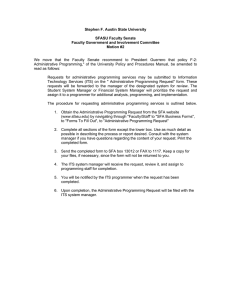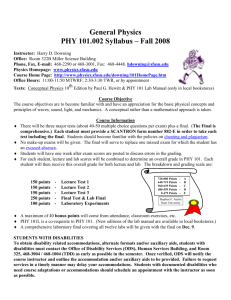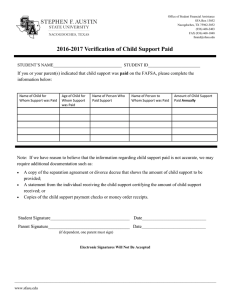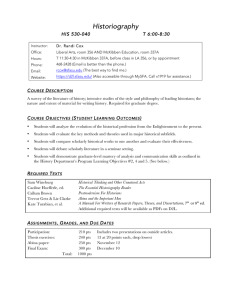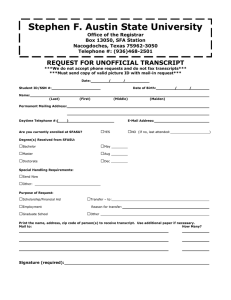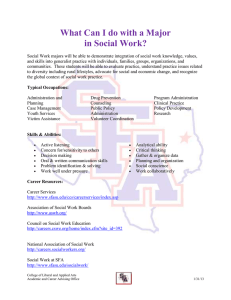Introduction to Historiography HIS 530-040 W 6:00-8:30
advertisement
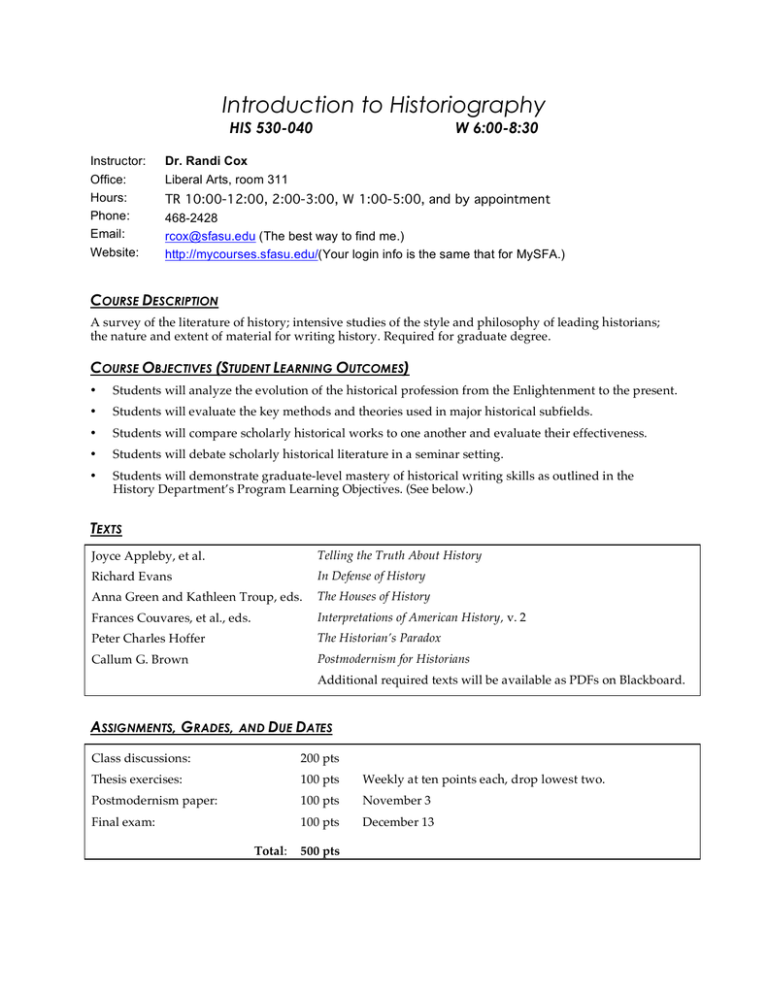
Introduction to Historiography HIS 530-040 Instructor: Office: Hours: Phone: Email: Website: W 6:00-8:30 Dr. Randi Cox Liberal Arts, room 311 TR 10:00-12:00, 2:00-3:00, W 1:00-5:00, and by appointment 468-2428 rcox@sfasu.edu (The best way to find me.) http://mycourses.sfasu.edu/(Your login info is the same that for MySFA.) COURSE DESCRIPTION A survey of the literature of history; intensive studies of the style and philosophy of leading historians; the nature and extent of material for writing history. Required for graduate degree. COURSE OBJECTIVES (STUDENT LEARNING OUTCOMES) • Students will analyze the evolution of the historical profession from the Enlightenment to the present. • Students will evaluate the key methods and theories used in major historical subfields. • Students will compare scholarly historical works to one another and evaluate their effectiveness. • Students will debate scholarly historical literature in a seminar setting. • Students will demonstrate graduate-level mastery of historical writing skills as outlined in the History Department’s Program Learning Objectives. (See below.) TEXTS Joyce Appleby, et al. Telling the Truth About History Richard Evans In Defense of History Anna Green and Kathleen Troup, eds. The Houses of History Frances Couvares, et al., eds. Interpretations of American History, v. 2 Peter Charles Hoffer The Historian’s Paradox Callum G. Brown Postmodernism for Historians Additional required texts will be available as PDFs on Blackboard. ASSIGNMENTS, GRADES, AND DUE DATES Class discussions: 200 pts Thesis exercises: 100 pts Weekly at ten points each, drop lowest two. Postmodernism paper: 100 pts November 3 Final exam: 100 pts December 13 Total: 500 pts Participation This course is a colloquium, and as such meetings will consist almost exclusively of discussion of the assigned readings. You must come to class having completed the readings and prepared to talk about them in detail. Note that 40% of your grade comes from participation. If you are not willing to actively participate in the discussions, you will not be successful in the course. Thesis exercises Each week you will write a two-paragraph thesis exercise on one of the assigned readings. Although the format may vary slightly depending on the week’s reading, they will follow a basic structure. The heading should be a CMS bibliography entry for the reading you have chosen. In the first paragraph you should summarize the author’s thesis, paying special attention to how the work demonstrates the theory or method under consideration for the week. In the second paragraph, you will compare the work to all of the other readings, showing key points of agreement and disagreement. I will give you more information on this assignment in class. Postmodernism paper You will write a 7-10 page review essay discussing the impact of postmodernism on the historical profession. Your sources for this paper will be the assigned class readings only. I will give you more information on this paper in class. Final exam There will be a final exam for the course which will be similar to the kind of exam you would take for comps, if you choose that track. COURSE POLICIES HISTORY DEPARTMENT MA PROGRAM LEARNING OUTCOMES The History Department has identified the following Program Learning Outcomes (PLOs) for all SFA students earning an M.A. degree in History: 1. The student will be able to explain the key issues and developments in at least two historical periods (one per course). 2. The student will be able to identify the main historical works and interpretive debates associated with an event or period. 3. The student will be able to locate, identify, and critically analyze primary sources. 4. The student will be able to research and analyze effectively an issue or topic in writing. 5. The student will be able to present written work in an appropriate academic style, including the proper citation of sources using Chicago Manual of Style (15th or most recent edition). This course will offer training in PLOs 2, 4 and 5. STUDENT RIGHTS AND RESPONSIBILITIES Consultations I take my responsibilities as an instructor seriously. You are warmly invited to come to my office hours to discuss readings, lectures or anything else that you have concerns or questions about. You may also make an appointment, if my hours are not convenient. Course responsibilities You should think of this course like joining a health club. As your personal trainer, it is my responsibility to show you how to do everything that is required of you. I give you my word that I will not deviate from the syllabus, except in case of an emergency. On the other hand, it is your responsibility to do the exercises and eat right—that is, to come to class, keep up with the reading, and prepare properly for assignments. The grade you earn is determined by the quality of your effort, not necessarily by the amount of time you spend. Attendance While attendance is not formally required in this class, poor attendance will obviously make it difficult to perform well. Students who fail to complete the course will receive a grade of QF, which may limit future eligibility for financial aid. Professionalism Students are expected to be on time and to behave in a professional manner. Disruptive behavior will not be tolerated, especially at the graduate level. ACADEMIC INTEGRITY (SFA POLICY A-9.1) Academic integrity is a responsibility of all university faculty and students. Faculty members promote academic integrity in multiple ways including instruction on the components of academic honesty, as well as abiding by university policy on penalties for cheating and plagiarism. Definition of Academic Dishonesty Academic dishonesty includes both cheating and plagiarism. Cheating includes but is not limited to (1) using or attempting to use unauthorized materials to aid in achieving a better grade on a component of a class; (2) the falsification or invention of any information, including citations, on an assigned exercise; and/or (3) helping or attempting to help another in an act of cheating or plagiarism. Plagiarism is presenting the words or ideas of another person as if they were your own. Examples of plagiarism are (1) submitting an assignment as if it were one's own work when, in fact, it is at least partly the work of another; (2) submitting a work that has been purchased or otherwise obtained from an Internet source or another source; and (3) incorporating the words or ideas of an author into one's paper without giving the author due credit. Please read the complete policy at http://www.sfasu.edu/policies/academic_integrity.asp WITHHELD GRADES (SFA POLICY A-54) Ordinarily, at the discretion of the instructor of record and with the approval of the academic chair/director, a grade of WH will be assigned only if the student cannot complete the course work because of unavoidable circumstances. Students must complete the work within one calendar year from the end of the semester in which they receive a WH, or the grade automatically becomes an F. If students register for the same course in future terms the WH will automatically become an F and will be counted as a repeated course for the purpose of computing the grade point average. DISABILITY POLICY (SFA POLICY F-33) To obtain disability related accommodations, alternate formats and/or auxiliary aids, students with disabilities must contact the Office of Disability Services (ODS), Human Services Building, and Room 325, 468-3004 / 468-1004 (TDD) as early as possible in the semester. Once verified, ODS will notify the course instructor and outline the accommodation and/or auxiliary aids to be provided. Failure to request services in a timely manner may delay your accommodations. For additional information, go to http://www.sfasu.edu/disabilityservices/. STUDENT BEHAVIOR (SFA POLICY D-34.1) Classroom behavior should not interfere with the instructor’s ability to conduct the class or the ability of other students to learn from the instructional program (see the Student Conduct Code, policy D-34.1). Unacceptable or disruptive behavior will not be tolerated. Students who disrupt the learning environment may be asked to leave class and may be subject to judicial, academic or other penalties. This prohibition applies to all instructional forums, including electronic, classroom, labs, discussion groups, field trips, etc. The instructor shall have full discretion over what behavior is appropriate/inappropriate in the classroom. Students who do not attend class regularly or who perform poorly on class projects/exams may be referred to the Early Alert Program. This program provides students with recommendations for resources or other assistance that is available to help SFA students succeed.
